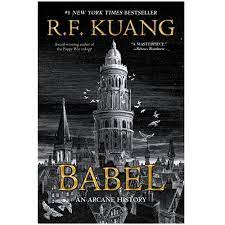 In 1830’s plague-ridden Canton, a peasant boy with a mysterious ‘gift’, is whisked away from certain death. His saviour and patron, an imperious Oxford lecturer, brings him to England and oversees the boy’s induction into the mysterious art of silverwork.
In 1830’s plague-ridden Canton, a peasant boy with a mysterious ‘gift’, is whisked away from certain death. His saviour and patron, an imperious Oxford lecturer, brings him to England and oversees the boy’s induction into the mysterious art of silverwork.
The boy, now a young man named Robin Swift, is admitted into Oxford University’s Royal Institute of Translation, or as the students and teachers call it, “Babel”. Babel is no ordinary language school however. It is first and foremost a silverwork laboratory, producing enchanted silver bars which power everything from factory machinery, to warships. This makes Babel vital to Britain’s industrial prowess and a crucial lynchpin her colonial machinations.
“Translation means doing violence upon the original, it means warping and distorting it for foreign, unintended eyes. So, where does that leave us? How can we conclude except by acknowledging that an act of translation is always an act of betrayal?” ― R.F. Kuang, Babel
Robin quickly falls in love; with Oxford, with academia, and with the other three other members of his cohort—all brilliant, young outsiders like himself. It isn’t long though, before putting his talent, and his mother tongue, to the service of the British Empire, starts to weigh on him.
Starting out as a sort of Dickensian Hogwarts, the novel shifts gears into a story of rebellion and resistance, reimagining Britain at the height of her colonial power, and the circumstances leading up to the opium wars. It is drowning in accolades, debuting at number one on The New York Times Best Seller list, and winning Blackwell’s Books of the Year for Fiction and the Nebula Award for Best Novel.
It is a big, ambitious book; a bellowing rebuke to colonial violence and the white elites who profit to this day, amidst handwringing and lukewarm protestations of impotence.
The book asks poignant questions about when—and how much—violence is acceptable as a form of protest, and whether change is even possible in the face of massive imbalances of power. As with most historical fantasy, a dark mirror is clearly being held up to the present, inviting us to question where our loyalties lie and how far we would be prepared to go to prevent an abominable act of injustice.
If I were nitpicking, I’d say there were some pacing issues. At times the story shuffles along too slowly and at others, skips important character-developing scenes, to catch you up hurriedly afterwards. The book is long and evidently had too much to pack in.
It deserves your patience. The world is seductive and the shift from ‘wizarding campus novel’ to resistance lit, is deftly handled. As a bonus, language nerds will love that the ‘magic’ is drawn from etymology; harnessing the power of meanings ‘lost in translation’ across languages sharing common roots.
Language in Babel, is power—literally the power to bend material reality to its whim—and in this spirit perhaps the novel itself is a weapon; a reminder that certain fights are ongoing, and that sometimes, violence is indeed a necessity.
If you’ve already read Babel, or the Necessity of Violence, let me know what you thought in the comments, and as always, don’t forget to sign up for future blog updates.
Buy on kindle £0.99
Paperback from WH Smiths £7.99
Follow the author @kuangrf and if you want more book recommendations, follow me on twitter @SLangridgeUK for updates on what I’m reading or check me out on TikTok @theyrhymesometime

0 Comments